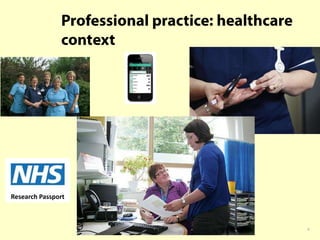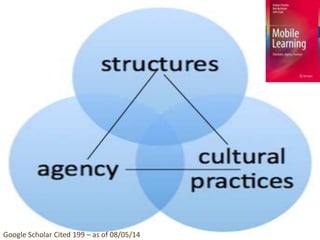Designing for Digital Learners (D4DL) UWE Bristol, UK, May 2014
- 1. 1
- 2. 1. Who are we? 2. Innovation 3. Creativity 4. Cultural resources 2
- 3. • Interdisciplinary • Theory => professional practice • 6 Principles (see D4DL postcard) • Design based research • Innovation, creativity and access to cultural resources • Digital social media & ubiquitous digital devices 3
- 4. 4 A 1668 illustration showing a contemporary London coffee house. Photo: Lordprice Collection / Alamy
- 5. Project Coordination Technology Research Regional Application Clusters Scaling Partners Technology Partners Health Care – Leeds Construction & Building – Bremen http://learning-layers.eu/
- 7. 7
- 8. 8 Co-Chair of Workshop EC-TEL Mobile Learning and Creativity with Neil Maiden co-founder of the Centre for Creativity in Professional Practice at City University London
- 9. 9
- 10. Google Scholar Cited 199 – as of 08/05/14
- 11. 11http://www.labs.bristolmuseums.org.uk/digital-principles D4DL UWE EG Ach So! – Semantic Video Amalysis app
Editor's Notes
- See Postcard
- See John’s Professorial Lecture: “Social Network Innovation in the Internet's Global Coffeehouses: Pandora, Learning Layers, Design Seeking and Scaling”. Slides: http://goo.gl/cuQkBJ, YouTube http://youtu.be/HWnyfqOxR6ESocial networks stand accused of being so called ‘weapons of mass distraction’ or worseIn fact in England in the late 1600s, very similar concerns were raised about coffee houses!Knowledge of the coffee tree appears in the middle of the 1400s, in the Sufi monasteries of Yemen. Initially it appears to have been used by Sufi Muslims in the 15th Century for staying awake for prayers at all hours of the night1677, Anthony Wood, an Oxford academic: “Why doth solid and serious learning decline, and few or none follow it now in the University?” he asked. “Answer: Because of Coffea Houses, where they spend all their time” (from Standage, 2013).As well as complaining that Christians had abandoned their traditional beer in favour of a foreign drink, critics worried that coffeehouses were keeping people from productive work. Royal Society, “Will's Coffee-House on Russell Street in London became known as the Wit's coffee-house. Presided over by English literary figure John Dryden; French Enlightenment “The Café Procope in particular became a centre of Enlightenment, welcoming such celebrities as Voltaire and Rousseau; stock exchange & Lloyds http://www.telegraph.co.uk/travel/destinations/europe/uk/london/9153317/London-cafes-the-surprising-history-of-Londons-lost-coffeehouses.html
- Major project FP7 IP Learning Layers (http://learning-layers.eu/) investigates informal learning in work based practice. The consortium consists of 17 institutions from 7 different countries. Total project budget over 4 years £10 million. Cook PI for UWE, £.5 million total; with Dr Patricia Santos and Dr Debbie Holley
- Personal Learning Networks (PLNs) Curating, managing and promoting a PLN develops Critical, creative, 21st century skills and socio-emotional capabilities
- Can you dance with data? Trust intimate information with strangers? Solve historical puzzles about your city in situ? Share your walk in the streets of Bristol? On 6th - 7th March 2014 D4DL ran the Ideas in Mobile Learning Symposium @ Watershed (see http://cloudworks.ac.uk/cloud/view/8540, has links to resources from the day).
- John is Co-Chair of the Workshop @ EC-TEL ‘Mobile Learning and Creativity’ with Neil Maiden co-founder of the Centre for Creativity in Professional Practice at City University London. We plan to bring people together for a possible EU project related to innovative/creative/culturally oriented use of mobile & wearable tools
- John and Patricia extensive experience of mobile & augmented reality explorations of London (Urban Planning), Barcelona (e.g. Botanical Gardens), Yorkshire (Fountains Abbey), Bristol (historical sites around Broad Quay area)Talk to Patricia:Solve historical puzzles about your city on in situ?Puzzle-based Games as a Metaphor for Designing In Situ Learning Activities
- Principle 2 (postcard): Mobile phones are new cultural resources that operate within an individualised mobile and convergent mass communication system. With Pachlar and Bachmair, in 2010 John publishes first ever monograph on mobile learningBeing used in teaching in such institutions as University Hull, University Leeds, University Stockholm, and University of California, Berkeley.
- Partnership Bristol Museums, Galleries and Archives (Zak Mensah, the Technical Development Manager at Bristol City Council)http://www.labs.bristolmuseums.org.uk/digital-principles/1st July – find out if we have our 2015-2018 Arts Council funding (approx. 1/3 of our revenue)











